Afghanistan: The Taliban's broken promises
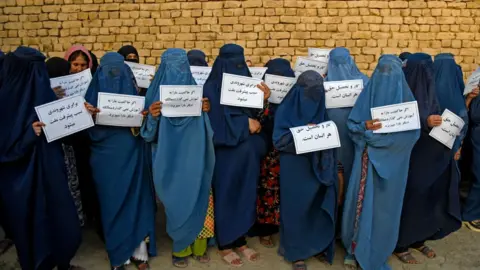 Getty Images
Getty ImagesTwo years ago, the Taliban swept into the Afghan capital, Kabul, as foreign forces hastily completed their withdrawal.
On taking power, the new administration made a series of pledges on women's rights to education, the economy and on tackling drug production.
How far have they lived up to these promises?
'We are going to allow women to work and study...women are going to be very active, but within the framework of Islam.'
This was Taliban spokesman, Zabihullah Mujahid, in August 2021.
Since then a wide range of strict measures have been re-imposed on women in Afghanistan.
In December last year, women were banned from attending university. This followed an existing ban on education for girls beyond the sixth grade (11 to 12-year-olds) imposed soon after the Taliban came to power.
According to the UN, around 80% of girls and young women of school age are not in education.
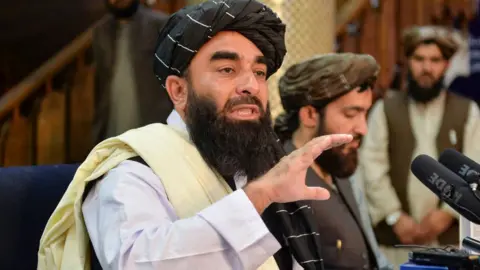 AFP
AFPThe Taliban have also banned women from working in all non-governmental organisations, as well as for the UN, and ordered the closure of beauty salons across the country.
Women's participation in the labour force has dropped by 25% between August 2021 and March 2023, according to the International Labour Organization.
Amnesty International and the International Commission for Jurists have said that the restrictions on women imposed in Afghanistan could constitute gender persecution under the International Criminal Court.
'There will be no production of drugs in Afghanistan…we will bring the production of opium to zero again.'
This was another pledge made by spokesman, Zabihullah Mujahid, soon after the Taliban took control two years ago.
Opium is used to make heroin - and Afghanistan has been, by far, the world's largest source of opium for many years.
In April 2022, the Taliban announced a ban on the growing of opium poppies - but without setting a deadline.
A BBC investigation in June this year found there had been a significant drop in cultivation in Helmand, Nangarhar and Kandahar provinces.
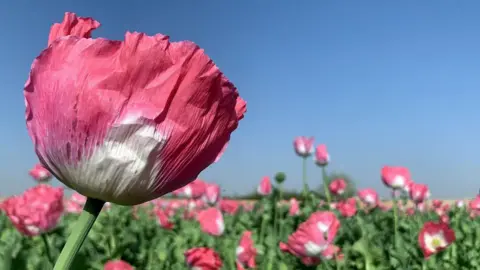 Getty Images
Getty ImagesIn Helmand province, which previously accounted for as much as half of all poppy production, there has been a reduction in the cultivated area from 129,000 hectares in 2022 to 740 hectares in April 2023, according to satellite imagery from UK-based analysts, Alcis.
Cultivation has also been significantly cut in Nangarhar - from 7,000 hectares in 2022 to just 865 hectares in 2023.
However, in more remote parts of the country, satellite imagery has revealed continued production.
'We are going to be working...in order to revitalise our economy, for our reconstruction, for our prosperity.'
Taliban plans for economic growth - expressed here in 2021 by Zabihullah Mujahid - have not been borne out in practice.
The suspension of most international aid and the freezing of access to Afghanistan's foreign exchange reserves have had serious economic consequences.
In June last year, the UN Security Council estimated that the Afghan economy had contracted by 30%-40% since the Taliban takeover.
Despite some limited improvement in economic indicators since then, the UN Development Programme (UNDP) says "overall, Afghanistan's economic outlook remains very difficult".
"This will be particularly so," it adds, "if the recent restrictions on women's employment in NGOs lead to a significant drop in international aid, exacerbating pressures on the exchange rate and inflation."
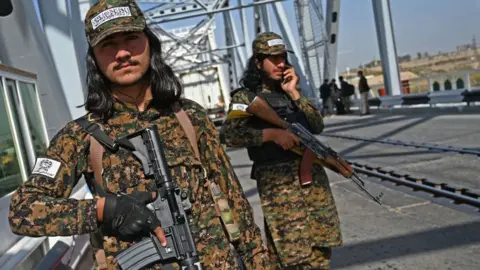 AFP
AFP'We [the Taliban] are committed to ensuring security.'
The UN Assistance Mission in Afghanistan (UNAMA) has recorded a significant fall in violence against civilians since the peak of the conflict in 2016.
However, attacks on former Afghan government and security officials, prisoners, women and journalists have continued.
According to the Armed Conflict Location and Event Data Project (Acled), civilians have been targeted by both the Taliban and rebel groups which oppose them such as the National Resistance Front (NRF), the largest armed anti-Taliban group.
"Attacks on civilians have often taken place in the context of Taliban raids on villages in search of NRF fighters. Civilians accused of supporting the NRF are frequently detained, tortured or killed," Acled notes in its latest report.
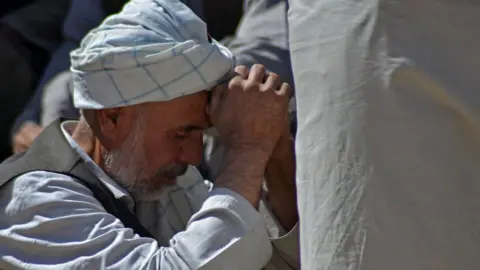 AFP
AFPWomen have also been the targets of assaults as more restrictions are placed their ability to work, acquire education and move freely in public spaces.
A UN survey conducted earlier this year said that 68% women felt their safety was "very bad" or "bad".


